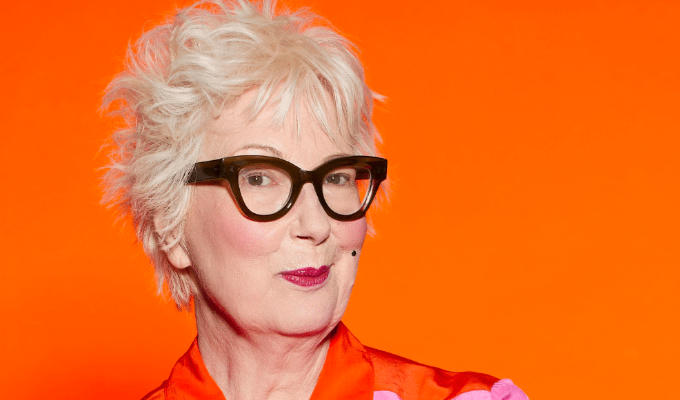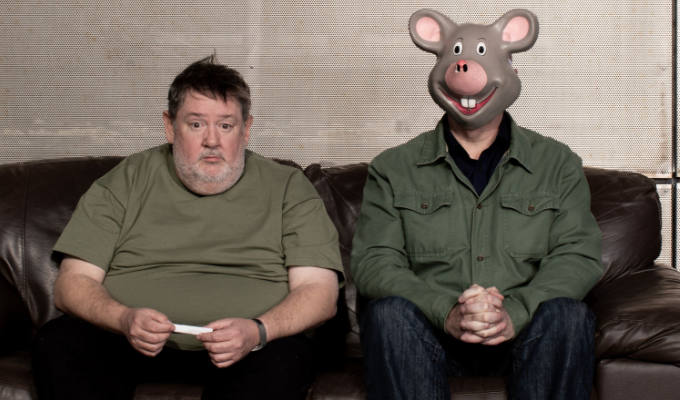
Lucky stars
You vote to keep ratings on Edinburgh reviews
Comedy fans have voted in favour of star ratings on Edinburgh reviews.
Exactly 400 people had their say in Chortle’s poll after we mooted the idea of dropping the blunt summaries to encourage more emphasis on the review itself.
But it seems fans – and to a lesser extent comedians – value the system.
Just over 34 per cent said we should ditch the stars completely, 29 per cent said we should keep things as they are, and 37 per cent said we should allow for half-stars to allow more finessing of the system.
Among comedians the stars were less popular – especially the more experienced the act.
A total of 48 per cent of professional comics wanted the stars ditched; compared to a third of amateur comics. Yet just 27 per cent of fans called for the stars to go.
Mostly the pressures of time and an easy way to navigate the jungle of shows on offer at the Edinburgh Fringe were cited as reasons the stars should say.
Publicists love the system, with just one in seven calling for it to go; while journalists hate it – with more than half wanted stars axed. Although in both these cases the sample size was small.
Chortle editor Steve Bennett said: ‘I really have my doubts about the stars, but since our readers voted 2-1 in favour of some sort of ranking system, they will be staying. And we’ll be looking at the possibility of adding half-stars, too – although that requires a tweak to the software that powers the site.’
Here are some of your comments:
In favour of the stars
Established acts have Lot of stars adorning their poster, which do, i think, draw in audience members (especially if it’s not a free show). If you get rid of star ratings, it’ll be just one more thing that makes it harder for newer, less established acts to bring in an audience. A significant part of a critic’s job is to point people in the direction of something that may not be well known, or well advertised, but has value. A star rating, though crude, is a useful way of doing this. Comedian Alexander Bennett
Reviews without stars make great reading, but unhelpful promotional material. Unless the reviewer is going to drop a solid pull quote in there, getting a review with no stars isn’t much help. Amateur comic Lewis Dunn
‘Stars are important at the festival because it is a quick and instant way to grab your everyday punter in amidst the masses. In such a sea of comedy, people want to know in an instant whether something is good or not as they are usually strapped for time between shows and only have a few seconds to decide. They will opt for instant gratification over pull quotes or longer reviews - it is unfortunately just the way it is during the mania of the Fringe. Outwith the festival I believe they are not necessary in the slightest. You are doing it right, basically…’ Comic Richard Gadd
‘I appreciate that it can be upsetting to have a year’s work reduced to a star rating. But if there were no stars, people would still summarise their opinion as “Great”, “Alright”, “Shit”, etc. And Lot of other workers have their work summarised as a score in their annual appraisal.’ Anonymous fan
Like it or lump it, the star rating is one way to see what the reviewer’s opinion of the show adds up to. Sure different publications are more generous, but the public cotton on quickly. Stars are so common across entertainment/arts, why should Chortle be an exception? Comedian Ashley Frieze
As someone who has received a four star review from Chortle- I can’t stress how useful that was for our fringe debut… I think comedy fans take genuine heed of Chortle reviews Anonymous professional comic
‘Time is a consideration and so I don’t necessarily have the option of reading all your Fringe reviews. So as a punter, when a show has 4 or 5 stars I will definitely make an effort to read the full review. I think the half star option is most useful for 3 and a half stars as it means 7 out of 10, and would encourage me to see the show.’ Adrienne
‘I do understand why journalists aren’t always keen on the star system, but the fact is that (for better or for worse) including 4 and 5 stars with a quote from a publication and then sticking that on a poster or flyer definitely helps a show get bums on seats. They also help create buzz, get more press to come in, get industry interested and other good things. But if we use a good quote but there are no stars, it’s often assumed that we’re trying to hide the fact that it’s a three star review.’ Publicist Madelaine Bennett
I’ve written for a number of video games websites, and at each we’ve tried ditching scores at the end of reviews, only to bring them back before too long- we’ve also tried ‘quirkier’ scoring systems, only for them to straight-up not work. They’re a nice shorthand for both writers and readers alike and ultimately help to focus a reviewers’ narrative towards a specific conclusion.’ Comedy fan Mark
‘Flyers need them. Is a highly selective positive quote, perhaps plucked from a steaming heap of critic-thrown crap, any better? I think not…’ Comedy fan Jon
Cannot think who on earth wouldn’t want stars apart from acts who are scared they have a 2 star show. Anonymous producer
Against them
Just seems pointless to have stars now that every publication uses them & every show has at least one 4 or 5 star review from somewhere. A good quote is much more useful, especially post fringe. Comedian Tiernan Doueib
‘The 5-star review can be a blessing and a curse, as a “5-star show” means different things to different people. To some that’s a show that has them laughing out loud for an hour, to others it’s a show that does something genuinely fascinating and different with the genre in a highly skilful way. You could still group reviews into three sections, with Highly Recommended and Recommended accolades topping the list of reviews. Essentially these would be replacing 4 and 5 star reviews, but in a slightly less reductive way.At a Fringe where almost every poster has a 4-star review sooner or later due to the various online publications that have cropped up over the years I think it would be a bold move for Chortle to do away with the system.’ Comedian Alexis Dubus
I am not a fan of the star system (unless you count the schadenfreude of looking for one star reviews of people I dislike) as it promotes laziness in the reader who might otherwise have to actually read the review to find out if the show is any good or not. That said, I am going to have my own “***** - Three Weeks” engraved on my headstone. Comedian David Heffron
Hate them. Who wants to give people marks. Also no one reads the bloody words any more. Reviewer Claire Smith
‘The stars become more important than the review and at the end of the day it’s just one person’s opinion. A good review should give enough pointer to indicate if the reader might like to see the show or not. A 5 star system is too rough a statement especially (as has been described at length) most shows are 3 or 4 star.’ Promoter Peter Dixon
Either just dish out stars for speed or write a detailed, considered review that allows people to understand whether they would enjoy the show personally. I don’t see the point in having a combination Comedy fan Cat
My main issue with the current Star System is how to assess an act who might be a bit more of a ‘risk taker’ who might ‘split a room’ and how to convey that to a potential audience without either putting off people who might enjoy it, or encouraging people who might not, which says more about the show than just 3 stars.. Comedian Al Greaves
Other comments
It would be great if there was more than one review of a show to balance out any skewing of perspective. Al Napp
Chortle says: This sounds like a terrible idea. It’s surely more authoritative to have one Chortle opinion rather than a host that you can pick and choose from (and of course plenty of other reviews are available outside of this site). Besides, we can only cover a fraction of the Fringe shows once – let alone cutting the number down to get second or third opinions on a select few.
You should force your reviewers to give the least amount of “3 star” as possible. 3 stars do not help anybody! Alex Martini
Chortle says: That’s the very flaw in the star system! Critics shouldn’t feel they have to give more or fewer stars to make a point, or to stand out and get attention. Inevitably the majority of shows will be perfectly decent 3* ones, but not recommended 4* ones.
One other option could be to keep star ratings but consider doing what Fringe Review does and not publish 2 star reviews or below (I believe they do send them to them on request). This would make Chortle solely a place to celebrate work worth seeing. Not that I don’t enjoy reading a one star review, I totally do, but in the interest of keeping things positive it may be something to consider even if just in individual cases. Withholding coverage is as damning as a bad review to the acts themselves but less embarrassing for people who, frankly, are losing Lot of money and probably just trying to do their best. Director Jon Brittain (and others made similar points)>
Chortle says: I don’t think ‘not embarrassing’ shows we don’t like should be a consideration and is rather a patronising ‘everyone’s a winner just for taking part’ attitude. Some shows are rubbish and people ought to be warned! The higher star ratings are better in context with lower ones too, I think. And if a show hasn’t got a star rating how would you know if we think it’s terrible, or just didn’t get around to seeing it. More selfishly, we’re in the business of publishing things, not ego-massaging, and it would be a huge waste of resources at such a busy month to go around seeing shows but not writing them up.
When I was a kid I used to buy a PC Gaming magazine which reviewed games with a percentage system. This, for me, was quick and concise yet also gave far more information than other magazines’ ‘out-of-5’ reviews. I would love a percentage system like this.
Chortle says: Such percentages surely give the illusion of far more scientific rigour than a necessarily subjective (though hopefully informed) review can give. Could you really separate a 78 per cent show from a 77? That said. We would love to hear comedians complain: ‘They gave me a 58 but it read like a 64…’
Published: 5 Jun 2015






